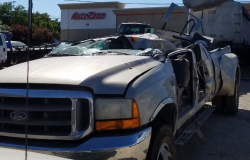— A Ford truck roof lawsuit has been dismissed after a judge ruled the plaintiffs waited too long to file the Ford rollover lawsuit.
According to the Ford truck roof lawsuit, Mikyley Rae Reitz was 25 years old when she was driving a 2001 Ford F-350 in San Luis Obispo County California on June 19, 2017.
According to the California Highway Patrol, the rear tires of the Ford F-350 left the road and rotated the truck counterclockwise.
The Ford truck then came back onto the road and rolled over, crushing the Ford truck roof as the truck landed upside down in the road.
The Highway Patrol reported residents said they thought the driver was "driving very fast" based on the sound of the truck.
Ms. Reitz was killed by blunt force trauma, something her family argues was caused by the crushed truck roof.
The Ford truck roof lawsuit, filed by her mother and father, alleges all 1999-2016 Ford Super Duty trucks have defective roofs that collapse in rollover crashes. However, the Mikyley Reitz wrongful death lawsuit involves only the 2001 Ford F-350 involved in her death.
Ford allegedly knew the truck roofs were dangerous and defective, but the automaker allegedly concealed the information from the public to owners of about 5 million 1999-2016 Super Duty trucks.
According to the Ford truck roof wrongful death lawsuit, Mikyley Reitz was allegedly killed because Ford wanted to save money.
"In the years of development leading to the release of the 1999 PHN131 chassis—the platform used by all Roof-Crush Defect Vehicles—Ford weakened almost every component of the roof structure to save money." — Ford truck roof lawsuit
The Ford truck roof collapse lawsuit was not filed until after a Georgia jury ordered Ford to pay $1.7 billion for the wrongful deaths of two 2002 Ford F-250 Super Duty truck occupants.
The Ford lawsuit was filed in the deaths of Melvin and Voncile Hill, who were killed when their Ford truck crashed because a Pep Boys service center installed the wrong size tire on the Ford F-250 Super Duty.
Ford said at trial the violent crash occurred when the tire blew out which caused the Ford truck roof to slam into the ground three times as the F-250 rolled up a hill.
In the lawsuit, the Hill family argued occupants have been killed or injured in about 80 rollover crashes of Ford Super Duty collapsed roofs. That is out of about 5.2 million model year 1999-2016 Ford Super Duty trucks.
The jury came back with the verdict by alleging the Ford truck roofs are too weak, awarding the plaintiffs $1.7 billion, with the lawyers requesting $600 million in fees and expenses.
Ford Truck Rollover Lawsuit Dismissed, Again
The Ford truck roof lawsuit was originally filed on February 7, 2023, nearly seven years after the crash. The judge dismissed the original rollover lawsuit but allowed the plaintiffs to file a first amended lawsuit which was also dismissed.
But Judge Percy Anderson allowed the plaintiffs to file another amended lawsuit which has now also been dismissed.
However, even though this latest Ford truck roof lawsuit has been dismissed, the judge said the plaintiffs can file a third amended lawsuit, which is the fourth lawsuit counting the original if the plaintiffs choose to refile the lawsuit by April 17, 2023.
In this latest action, the judge dismissed the truck roof lawsuit by ruling the plaintiffs waited too long to file their complaint.
In Ford's motion to dismiss the rollover lawsuit, the automaker argues the claims against Ford are "barred by the applicable statute of limitations."
According to the plaintiffs, the statute of limitations should be suspended (tolled) because Ford allegedly failed to warn customers the trucks were equipped with defective roofs.
The judge says the plaintiffs rely on California's "delayed discovery" rule to toll the statute of limitations for personal injuries, which is two years.
The plaintiffs claim they didn't know about the allegedly defective Ford truck roofs until November 2022 after a jury found Ford should pay $1.7 billion in the Hill v. Ford case.
According to Judge Anderson:
“In order to adequately allege facts supporting a theory of delayed discovery, the plaintiff must plead that, despite diligent investigation of the circumstances of the injury, he or she could not have reasonably discovered facts supporting the cause of action within the applicable statute of limitations period.”
The judge also ruled that waiting "until after they had become aware of news reports of a verdict in a similar case indicates that Plaintiffs did nothing following Decedent’s death to investigate a possible claim."
Because the crash and death occurred on June 19, 2017, the statute of limitations would have expired on June 19, 2019.
The judge will give the plaintiffs the opportunity to "cure their deficient allegations" if they want to file the lawsuit for the fourth time by April 17, 2023.
The Ford truck roof lawsuit was filed in the U.S. District Court for the Central District of California: Rick Landers, et al. for the Estate of Mikyley Reitzv v. Ford Motor Company.
The plaintiffs are represented by Hagens Berman Sobol Shapiro LLP.

